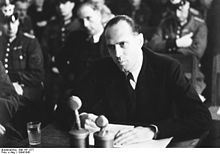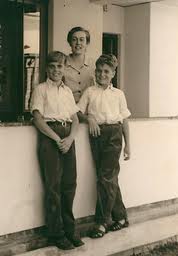06 Aug Freya von Moltke: Tribute to a Resister
One day in early January 1945, Freya von Moltke walked through bomb-gutted Berlin to visit Roland Freisler, the judge-presider of the show-trials that had been set up after the July,1944 failed attempt on Hitler’s life. At the trials, the defendants had to stand before Freisler, some forced to hold up their pants because suspenders and belts had been removed, while he mocked and humiliated them.
Freya von Moltke
![images[2] - Copy (2)](https://maryfrancescoady.com///wp-content/uploads/2013/09/images2-Copy-2.jpg) An army officer in the “People’s Court”. Belts, suspenders and military honors have been removed, so as to inflict as much humiliation as possible.
An army officer in the “People’s Court”. Belts, suspenders and military honors have been removed, so as to inflict as much humiliation as possible.
 Helmut von Moltke seated (at his wife’s request) before the Nazi judge, Roland Freisler
Helmut von Moltke seated (at his wife’s request) before the Nazi judge, Roland Freisler
Frau von Moltke’s mission was to request a chair for her husband, Helmuth, who was coming up for trial and who had been suffering from sciatica after a year in prison. Freisler politely agreed to her request, but then, during the trial a few days later, poured the same invective on the seated Moltke as he had done on the others. Finding nothing specific to condemn in him, Freisler decided that Moltke was guilty of treasonous thoughts against the Third Reich.![moltke_todesurteil[1]](https://maryfrancescoady.com///wp-content/uploads/2013/09/moltke_todesurteil1-300x200.jpg) He was executed by hanging on January 23, 1945. On New Year’s Day of this year, Freya von Moltke died at the age of ninety-eight. She and Helmuth, an international lawyer who was four years her senior, had married in 1931. He was from an aristocratic family in Kreisau, Silesia (now part of Poland).
He was executed by hanging on January 23, 1945. On New Year’s Day of this year, Freya von Moltke died at the age of ninety-eight. She and Helmuth, an international lawyer who was four years her senior, had married in 1931. He was from an aristocratic family in Kreisau, Silesia (now part of Poland). ![2010_vonMoltke_parents_237x198[1]](https://maryfrancescoady.com///wp-content/uploads/2013/09/2010_vonMoltke_parents_237x1981.jpg) An early opponent of the Nazis, in 1941 he drew together a group including three Jesuits, to begin planning a postHitler Germany. Freya, also a lawyer by training, became part of the group, later known as the “Kreisau Circle”. At the same time she ran the family estate and cared for their two young sons.
An early opponent of the Nazis, in 1941 he drew together a group including three Jesuits, to begin planning a postHitler Germany. Freya, also a lawyer by training, became part of the group, later known as the “Kreisau Circle”. At the same time she ran the family estate and cared for their two young sons.
The Kreisau Circle’s meetings, three of which took place at the von Moltke estate, were conducted in deep secrecy.
The group’s meetings, three of which took place at the estate in 1942 and 1943, were conducted in deep secrecy. Freya hid the group’s documents in the Kreisau beehives. In January 1944, as the Gestapo began to close in on the resistance, Moltke was arrested. Soon after his death in 1945, as she was still mourning his loss, the Russian army took over the estate. Freya von Moltke picked up the pieces of her shattered life and carried on, first moving to South Africa before returning to Germany in 1956 and finally settling in the United States in 1960.
I met Frau von Moltke in the year 2000 at her home in a suburban neighborhood in Norwich, Vermont, while I was researching the life of the Jesuit Alfred Delp, a member of the Kreisau group. She lived in a long, low house and wore the loose, comfortable trousers and sweater of a country dweller. We settled in easy chairs, and when I tried unsuccessfully to take her photo with my borrowed camera, she showed me how to work it, and then with a smile, proceeded to take my photo. This small gesture, I later thought, reflected the qualities that this woman had needed in resisting the tyranny of Nazism: calm efficiency, cool-headed determination, and that antidote against despair: a sense of humor. But there was also something else: iron courage in the face of a ruthless system in which the Gestapo’s eyes were everywhere, when one careless word could result in brutal disaster.
“We didn’t let the fear come close to us.”
“We didn’t let the fear come close to us,” Frau von Moltke told me in a matter of fact voice that was tinged with the intense memory of those heightened times. “It didn’t seem hopeless,” she went on, speaking of the Kreisau group’s work. “We knew the Reich would fall, and it was important to show that some people at that time, not being able to do anything else, were envisioning a democratic German future.” Although the participants knew that their deliberations were considered high treason, “we were jolly and there was a feeling of serenity in the group.”
She grew more reticent when I asked about the prison visits with her husband, which took place in the presence of guards and the prison’s director. When I said, ineptly, “That would have been very difficult for you,” her eyes widened in horror. “Oh heavens! It was beyond difficult. There are no words….” And yet even then, when the forces had ranged against him, “There was always a good side to the visits—they were a wonderful chance to see him.”
“It was beyond difficult”
Freya von Moltke was one of the few who survived to bear witness to the efforts of the resistance in Nazi Germany. In 1998, she helped create a center for German-Polish understanding at the estate (Krzysowa in Polish). May her strong, brave soul rest in peace.
—Commonweal, April 9, 2010



![images[2]](https://maryfrancescoady.com///wp-content/uploads/2012/08/images2.jpg)
